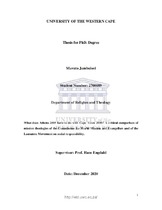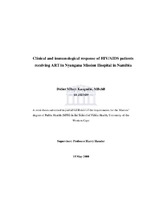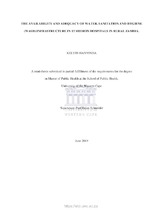FACING THE IMAGE IN THE MIRROR: “WHITENESS” IN SOUTH AFRICAN MISSIONAL DISCOURSE
Abstract
This study is situated within the discipline of missiology and seeks to contribute to missional
theology as one important contemporary school of thought within the discipline. Missional
theology emerged in the 1990s especially within the Anglophone contexts of the United
Kingdom (UK) and the United States of America (USA). Most forms of missional theology build
on the insights of Lesslie Newbigin, who in several books, reflected from his cross-cultural
missionary experience on the challenges of the gospel to churches within his own cultural
context in the UK. Such insights were quickly adopted in the North American context and was
further explored by the Gospel and Our Cultural Network which emphasised the local-churchin-mission. Local congregations where missional theology flourished rediscovered that the
fundamental reasons for the church’s existence involves an engagement within local
communities.
Related items
Showing items related by title, author, creator and subject.
-
What does Athens 2005 have to do with cape town 2010? A critical comparison of mission theologies of the commission for world mission and evangelism and of the Lausanne movement on social responsibility.
Jambulosi, Mavuto (University of Western Cape, 2020)This research compares the similarities and differences in the official documents and proceedings of the Commission for World Mission and Evangelism (CWME) in Athens 2005 and the Lausanne Movement held in Cape Town in 2010. ... -
Clinical and immunological response of HIV/AIDS patients receiving ART in Nyangana mission hospital in Namibia
Kangudie, Didier Mbayi (2008)This study aims to analyse the clinical and immunological responses and survival pattern of HIV/AIDS patients receiving ART in Nyangana District -
The availability and adequacy of water, sanitation and hygiene (wash) infrastructure in 13 mission hospitals in rural Zambia
Hanyinda, Kelvin (University of the Western Cape, 2019)Background and Rationale The World Health Organization (WHO) has shown that the provision of Water Sanitation and Hygiene (WASH) in Health Care Facilities (HCFs) of many low and middle-income countries is poor. This is ...




